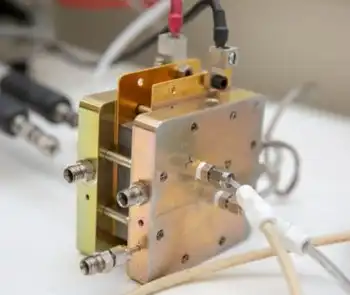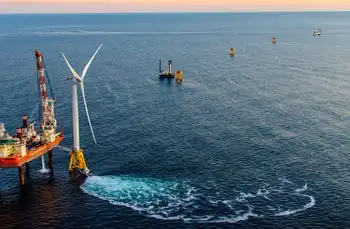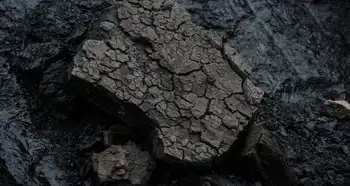Special measures help divert birds from power lines
United Kingdom -- - Hundreds of special diverters have saved migrating swans and geese from colliding with overhead power lines in Lancashire following the first study of its kind in the United Kingdom.
The regionÂ’s power network operator, Electricity North West in partnership with WWT Martin Mere Wetland Centre, has seen a 50 percent reduction in power cuts caused by bird collisions after 150 bird diverters were attached to overhead power lines last winter in the area surrounding the Wildfowl and Wetlands Trust WWT site in Burscough.
As a result, recently engineers installed a further 200 diverters along 2km of overhead power lines to help raise the visibility for the 30,000 pink-footed geese and whooper swans that migrate to the area every year from Iceland. Special diverters installed near Martin Mere in Lancashire by Electricity North West.
Over the past year, Electricity North West has sponsored a student from Lancaster University to analyse the efficiency of bird diverters. The results from the unique study, the first of its kind in the UK, will be used throughout the North West and shared with other power operators across the country.
Steve Cox, head of engineering for Electricity North West, said, “We’re delighted that these special bird diverters have had a positive impact and helped to protect birds and also reduce power cuts for residents in the area.
“Working closely with WWT Martin Mere we’re set to install even more diverters over the next year and we will work to incorporate key findings from the study in our best practice policies across the North West to help protect more of these wonderful birds.”
Key findings from the study found that whooper swans rather than pink-footed geese were more likely to collide with power lines due to their flight path and there is an increased risk of collision if electricity lines are in an open landscape or close to surface water.
Special measures help divert thousands of birds from power lines. WWT Martin Mere centre manager, Nick Brooks, said, “Over autumn and winter WWT Martin Mere offers a fantastic wildlife experience of up to 30,000 pink-footed geese and 2,500 whooper swans.
“Through this innovative partnership with Electricity North West we have secured both the safety of these swans and geese as well as ensuring the local community are not affected by power cuts.
“The pioneering study into bird diverters helps to reinforce the importance and effectiveness of the diverters and we’re delighted that the power network operator is installing further diverters in the area.”
Chris Taylor, research student from Lancaster University, said, “Bird diverters, which are special attachments to power lines, work by ensuring the cables stand out to large birds which have poor maneuverability.
“After a year of examining the flight paths and behavioral characteristics of these birds across the North West I’m thrilled that the key findings I’ve uncovered will be taken on board and considered across the country.”
Related News

New fuel cell concept brings biological design to better electricity generation
MADISON - Fuel cells have long been viewed as a promising power source. But most fuel cells are too expensive, inefficient, or both. In a new approach, inspired by biology, a team has designed a fuel cell using cheaper materials and an organic compound that shuttles electrons and protons.
Fuel cells have long been viewed as a promising power source. These devices, invented in the 1830s, generate electricity directly from chemicals, such as hydrogen and oxygen, and produce only water vapor as emissions. But most fuel cells are too expensive, inefficient, or both.
In a new approach, inspired by biology and published…




